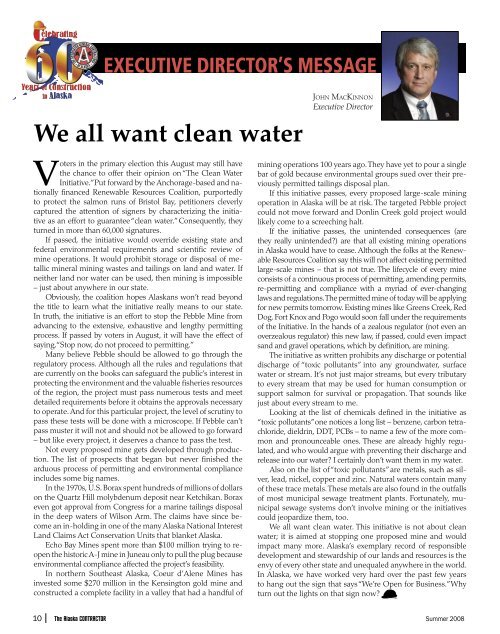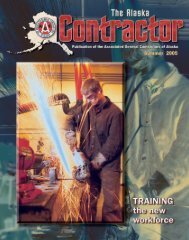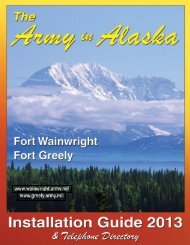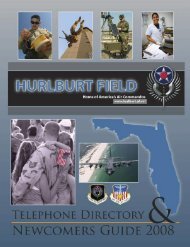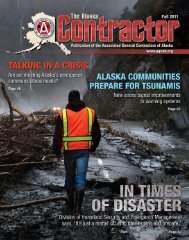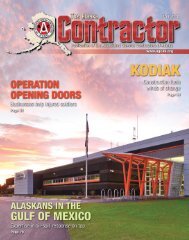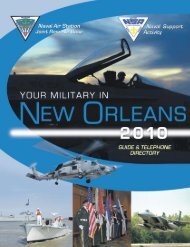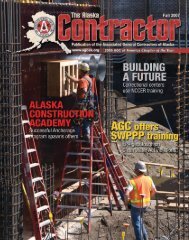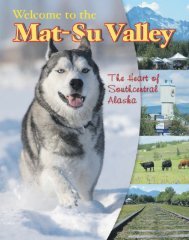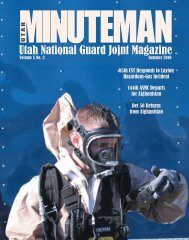The Alaska Contractor - Summer 2008
The Alaska Contractor - Summer 2008
The Alaska Contractor - Summer 2008
You also want an ePaper? Increase the reach of your titles
YUMPU automatically turns print PDFs into web optimized ePapers that Google loves.
EXECUTIVE DIRECTOR’S MESSAGE<br />
We all want clean water<br />
Voters in the primary election this August may still have<br />
the chance to offer their opinion on “<strong>The</strong> Clean Water<br />
Initiative.” Put forward by the Anchorage-based and nationally<br />
financed Renewable Resources Coalition, purportedly<br />
to protect the salmon runs of Bristol Bay, petitioners cleverly<br />
captured the attention of signers by characterizing the initiative<br />
as an effort to guarantee “clean water.” Consequently, they<br />
turned in more than 60,000 signatures.<br />
If passed, the initiative would override existing state and<br />
federal environmental requirements and scientific review of<br />
mine operations. It would prohibit storage or disposal of metallic<br />
mineral mining wastes and tailings on land and water. If<br />
neither land nor water can be used, then mining is impossible<br />
– just about anywhere in our state.<br />
Obviously, the coalition hopes <strong>Alaska</strong>ns won’t read beyond<br />
the title to learn what the initiative really means to our state.<br />
In truth, the initiative is an effort to stop the Pebble Mine from<br />
advancing to the extensive, exhaustive and lengthy permitting<br />
process. If passed by voters in August, it will have the effect of<br />
saying, “Stop now, do not proceed to permitting.”<br />
Many believe Pebble should be allowed to go through the<br />
regulatory process. Although all the rules and regulations that<br />
are currently on the books can safeguard the public’s interest in<br />
protecting the environment and the valuable fisheries resources<br />
of the region, the project must pass numerous tests and meet<br />
detailed requirements before it obtains the approvals necessary<br />
to operate. And for this particular project, the level of scrutiny to<br />
pass these tests will be done with a microscope. If Pebble can’t<br />
pass muster it will not and should not be allowed to go forward<br />
– but like every project, it deserves a chance to pass the test.<br />
Not every proposed mine gets developed through production.<br />
<strong>The</strong> list of prospects that began but never finished the<br />
arduous process of permitting and environmental compliance<br />
includes some big names.<br />
In the 1970s, U.S. Borax spent hundreds of millions of dollars<br />
on the Quartz Hill molybdenum deposit near Ketchikan. Borax<br />
even got approval from Congress for a marine tailings disposal<br />
in the deep waters of Wilson Arm. <strong>The</strong> claims have since become<br />
an in-holding in one of the many <strong>Alaska</strong> National Interest<br />
Land Claims Act Conservation Units that blanket <strong>Alaska</strong>.<br />
Echo Bay Mines spent more than $100 million trying to reopen<br />
the historic A-J mine in Juneau only to pull the plug because<br />
environmental compliance affected the project’s feasibility.<br />
In northern Southeast <strong>Alaska</strong>, Coeur d’Alene Mines has<br />
invested some $270 million in the Kensington gold mine and<br />
constructed a complete facility in a valley that had a handful of<br />
JOHN MACKINNON<br />
Executive Director<br />
mining operations 100 years ago. <strong>The</strong>y have yet to pour a single<br />
bar of gold because environmental groups sued over their previously<br />
permitted tailings disposal plan.<br />
If this initiative passes, every proposed large-scale mining<br />
operation in <strong>Alaska</strong> will be at risk. <strong>The</strong> targeted Pebble project<br />
could not move forward and Donlin Creek gold project would<br />
likely come to a screeching halt.<br />
If the initiative passes, the unintended consequences (are<br />
they really unintended?) are that all existing mining operations<br />
in <strong>Alaska</strong> would have to cease. Although the folks at the Renewable<br />
Resources Coalition say this will not affect existing permitted<br />
large-scale mines – that is not true. <strong>The</strong> lifecycle of every mine<br />
consists of a continuous process of permitting, amending permits,<br />
re-permitting and compliance with a myriad of ever-changing<br />
laws and regulations. <strong>The</strong> permitted mine of today will be applying<br />
for new permits tomorrow. Existing mines like Greens Creek, Red<br />
Dog, Fort Knox and Pogo would soon fall under the requirements<br />
of the Initiative. In the hands of a zealous regulator (not even an<br />
overzealous regulator) this new law, if passed, could even impact<br />
sand and gravel operations, which by definition, are mining.<br />
<strong>The</strong> initiative as written prohibits any discharge or potential<br />
discharge of “toxic pollutants” into any groundwater, surface<br />
water or stream. It’s not just major streams, but every tributary<br />
to every stream that may be used for human consumption or<br />
support salmon for survival or propagation. That sounds like<br />
just about every stream to me.<br />
Looking at the list of chemicals defined in the initiative as<br />
“toxic pollutants” one notices a long list – benzene, carbon tetrachloride,<br />
dieldrin, DDT, PCBs – to name a few of the more common<br />
and pronounceable ones. <strong>The</strong>se are already highly regulated,<br />
and who would argue with preventing their discharge and<br />
release into our water? I certainly don’t want them in my water.<br />
Also on the list of “toxic pollutants” are metals, such as silver,<br />
lead, nickel, copper and zinc. Natural waters contain many<br />
of these trace metals. <strong>The</strong>se metals are also found in the outfalls<br />
of most municipal sewage treatment plants. Fortunately, municipal<br />
sewage systems don’t involve mining or the initiatives<br />
could jeopardize them, too.<br />
We all want clean water. This initiative is not about clean<br />
water; it is aimed at stopping one proposed mine and would<br />
impact many more. <strong>Alaska</strong>’s exemplary record of responsible<br />
development and stewardship of our lands and resources is the<br />
envy of every other state and unequaled anywhere in the world.<br />
In <strong>Alaska</strong>, we have worked very hard over the past few years<br />
to hang out the sign that says “We’re Open for Business.” Why<br />
turn out the lights on that sign now?


